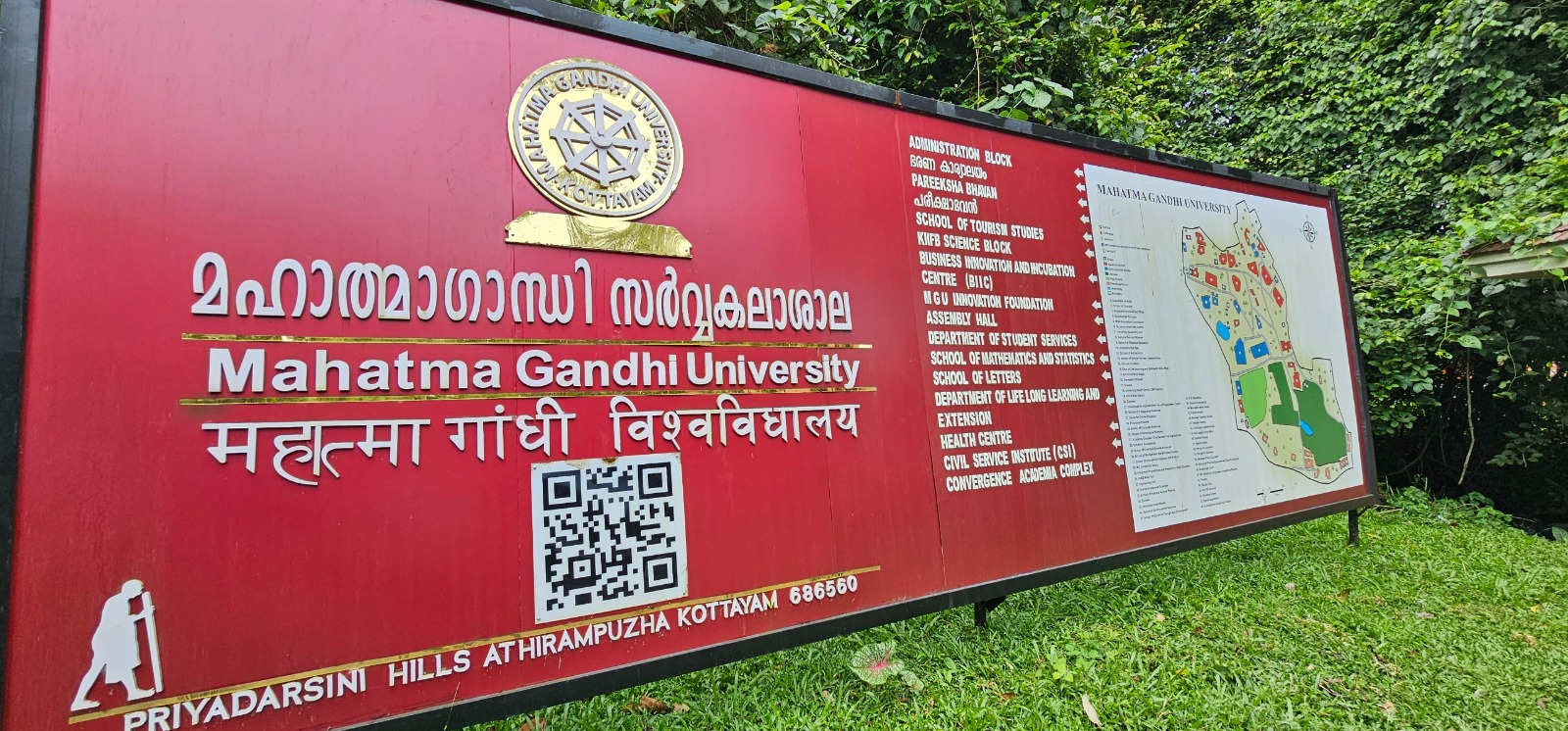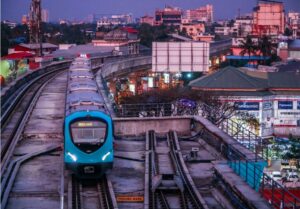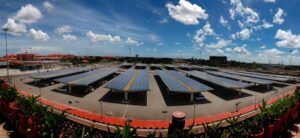Published Jun 28, 2025 | 6:55 PM ⚊ Updated Jun 28, 2025 | 6:55 PM

From campus waste to solar power: How Kerala’s institutions earned crores in green revenue
Synopsis: A study published in Kerala Economy, the journal of the Gulati Institute of Finance and Taxation (GIFT), reveals that Kerala’s eco-friendly public institutions have generated over ₹33 crore through climate adaptation efforts. Analyzing strategies adopted by MGU, KMRL, KWML, and CIAL, the study shows how sustainable practices not only address climate risks but also enhance economic resilience and global recognition
Kerala’s eco-friendly public institutions have not just earned global applause — they’ve generated over ₹33 crore through climate adaptation initiatives.
This finding has been made in a study published in Kerala Economy, the journal of the Gulati Institute of Finance and Taxation (GIFT)- an autonomous institution of the Government of Kerala.
It reveals how leading public sector institutions in the state have turned climate challenges into opportunities by embracing sustainable, eco-friendly projects.
The study, which analysed the adaptation strategies of Mahatma Gandhi University (MGU), Kochi Metro Rail Limited (KMRL), Kochi Water Metro Limited (KWML), and Cochin International Airport Limited (CIAL), highlights how institutional frameworks can effectively tackle local climate vulnerabilities while boosting economic resilience.
Titled ‘Institutional Adaptation of a Few Selected Public Sector Institutions in Kerala in the Context of Climate Change’, the paper investigates how institutional frameworks are facilitating sustainable, locally relevant adaptation strategies that align with global Sustainable Development Goals (SDGs).
The study, according to researchers from the KN Raj School of Economics, MG University, Kottayam, adopts a case study approach, analyzing the climate adaptation strategies of three pivotal public institutions in Kerala:
– Mahatma Gandhi University (MGU), Kottayam, a prominent state university established in 1983, MGU has gained recognition for its strong emphasis on research, academic excellence, and sustainable development initiatives.
– Kochi Metro Rail Limited (KMRL), which plays a critical role in transforming urban mobility through eco-friendly, energy-efficient public transport systems, reducing traffic congestion and urban carbon emissions.
– Cochin International Airport Limited (CIAL), an international icon in sustainability, CIAL holds the distinction of being the world’s first fully solar-powered airport, leading with innovative practices in energy management and environmental stewardship.
According to the researchers, the study relies on a combination of primary and secondary data, incorporating the economic valuation of technical data provided by these institutions, alongside descriptive statistics.
It evaluates the effectiveness of eco-friendly projects in addressing local climate vulnerabilities and promoting resilience.
According to them, the findings highlight the need for tailored, context-specific solutions that simultaneously address regional challenges and contribute to Kerala’s broader climate action framework.
These institutions not only enhance the state’s socio-economic landscape but also draw international appreciation for their progressive and sustainable operational models, they point out.
The study notes that MGU, one of Kerala’s premier public universities, is emerging as a model for eco-friendly campus management through its innovative waste and resource management initiatives.
Established in 1983, the university is located on a sprawling 110-acre campus in Priyadarsini Hills, Athirampuzha, Kottayam.
The researchers documents that central to MGU’s sustainability drive is its Advanced Centre of Environmental Studies and Sustainable Development (ACESSD), which promotes interdisciplinary research in sustainable resource management.
Among the university’s flagship projects is ‘Nirmalam MGU’, a green protocol initiative focused on converting organic residue into valuable resources. The initiative produces potting mixtures using compost derived from food waste, dry leaves, and other biodegradable materials generated on campus. Students are actively involved in packaging the pot mixtures, earning a nominal wage, making it both an economic and educational opportunity.
A waste audit conducted in 2024 revealed that the university earned over ₹9 lakh from scrap sales between June 2021 and April 2022.
Valued answer sheets alone contributed ₹3.77 lakh, while iron scrap fetched ₹2.35 lakh.
Systematic segregation and recycling of paper, cartons, aluminium, and even discarded tyres reflect the university’s comprehensive approach to residue management, the study highlighted.
Another remarkable initiative, the report says, is ‘Raveendra Sarovaram’, a reclaimed water reservoir formed from an abandoned quarry pit. With a storage capacity of 4.5 crore litres, replenished by rainwater from over 20 buildings, it significantly offsets the campus’s water needs.
The study further lauds MGU’s efforts as it exemplify how academic institutions can pioneer practical, scalable models for environmental sustainability.
The study notes that the Kochi Metro Rail Limited (KMRL), inaugurated in June 2017, has steadily expanded from its initial 13.2 km Aluva-Palarivattom corridor to Thrippunithura railway station. And its ambitious vision is to make Kochi India’s first city where metro trains, buses, boats, auto-rickshaws, and taxis operate under a unified ticketing and control system.
KMRL’s green credentials are equally remarkable, highlighted the study.

Kochi Metro Rail
It requires 20 MW of power daily, with more than 50 percent sourced from renewable energy. Solar panels installed atop metro stations and on a 40,000 sq.m ground at Muttom together generate 5.389 MWp.
This shift to solar energy reduces annual CO2 emissions by over 11,236 tons, valued at nearly ₹2 crore in carbon savings, the researchers found. The Metro has also partnered with Carbon and Whales, a firm that converts plastic waste into furniture.
Kochi Metro stations now feature 160 recycled plastic leaning benches, cutting carbon emissions by 87% compared to virgin plastic. The carbon savings from this initiative alone translate to ₹1.71 crore.
Complementing the metro is the Kochi Water Metro Limited (KWML), India’s first water metro service, launched in December 2021.
In 445 days, it ferried 25 lakh passengers, covering 93 lakh passenger kilometres, and reducing diesel use by 758 tons. This eco-friendly switch to electric ferries has cut carbon emissions by 1,720 tons — a ₹3 million saving in environmental value.
The researchers notes that CIAL which started with a modest 100kWp solar plant in 2013, rapidly expanded its green energy capacity to 13.1MWp by 2015.
Today, CIAL boasts a total installed solar capacity of 50MWp, making it the second-largest power producer in Kerala after the state-run KSEB.

solar plant
Since its renewable energy journey began, CIAL has generated over 25 crore units of green power through various solar PV installations within the airport premises.
A significant addition came in March 2022, when a 12MWp solar plant was commissioned in Payyannur, producing approximately one crore units of clean energy to date.
The airport’s solar initiative has reduced carbon emissions by over 1.76 lakh metric tonnes, with a monetary carbon-saving value of around ₹30 crore, noted the study.
Combined with other resource conservation efforts, the total external benefits are valued at ₹34 crore — helping CIAL recover 11.11 percent of its initial ₹270 crore solar investment through environmental gains.
In short, the study underscores how proactive institutional-level climate adaptation can yield both environmental and economic benefits. By examining three major institutions the study highlights effective practices like systematic waste management, carbon-saving initiatives, and resource conservation.
Collectively, these adaptation strategies have brought in an impressive ₹33 crore, proving that climate-resilient initiatives can be financially rewarding as well.
The study positions these institutions as role models, suggesting that Kerala’s, as well as other states’, other public sector bodies should emulate such models to strengthen both environmental sustainability and institutional finances.
It emphasises the importance of integrating climate adaptation into the core operational strategies of public institutions.
Said an official of the Environment Department, “This study reaffirms that climate action, when integrated into the core functioning of public institutions, is not just environmentally essential but economically rewarding. Kerala’s experience shows that sustainable development and financial prudence can go hand in hand, offering a replicable model for other states facing climate challenges. These initiatives prove that local actions can indeed create impact.”
(Edited by Ananya Rao)

